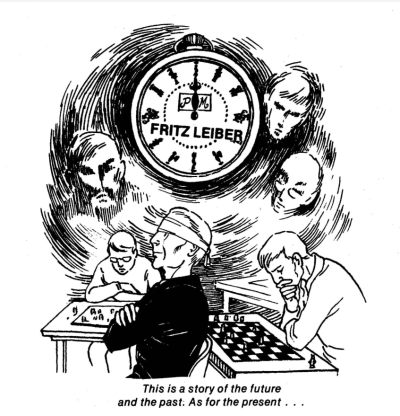Kris
I am curious to see what other people have to say on this as I am struggling to think of any interesting comments I can make.
It seems to be a reasonable but quite hoary gothic story that just happens to be set in the world of chess. I wouldn’t have been surprised to read this in an old Weird Tales issue of the 40s.
Leiber is a great writer and it ticks along in a quite nice and atmospheric way, but not seeing much special.
Would love to see if anyone else sees anything more in it?
Brian
This feels retrograde, even for the ’70s. Kris brought up Weird Tales but I think this also could’ve been submitted to Unknown. Wouldn’t be the first Uknown urban fantasy yarn featuring some schmuck who buys a mysterious supernatural object at a store that then exists stage left: see Robert Bloch’s “The Cloak” and Theodore Sturgeon’s “Shottle Bop.” In fairness to the schmuck of this particular story, Ritter already knew about the special Paul Morphy watch, so it’s not like he went in blind like a true dunce.
The irony is that “Midnight by the Morphy Watch” holds up better than the last couple stories we’ve read, I think in no small part because it takes place in San Fran circa 1970 so the values dissonance is more expected. The unnamed Black character doesn’t even talk in that caricatured a fashion, although Fritz Leiber was notably one of the more left-leaning authors from Campbell’s roster. I’m not even sure if Leiber went to Campbell after 1950; he seemed far more at home with Galaxy and Fantastic. Jim Baen was also of the right-libertarian persuasion, but aside from some “those darn liberals” moments he had good taste; a shame he only got a handful of issues for If before the publisher sank it, but at least we got a few years of Baen’s Galaxy.
In other words, I like this one a fair bit. It’s deceptively simple, despite some quirks, like I can’t help but get a hint of autobiography from Stirf Ritter-Rebel (a ridiculous name, but as Ritter points out, famous chess players tend to have goofy names), and of course Leiber (a couple awkward phrases aside) is a pretty capable stylist. I don’t think it’s a coincidence that Leiber played easily alongside authors 30 years his junior, at a time when standards for not-clunky writing in SFF were going way up. I’d check “Midnight by the Morphy Watch” out, it’s good late-period Leiber and fairly indicative of what he’s all about.
Kit
For some reason I’m thinking of “Or All the Seas with Oysters” again. Maybe because they’re both “and then the inanimate objects come to kill you!” Or alternatively that one episode of Twilight Zone with the pool player once it comes out that he was sold it by a supposedly dead chess champion. I’m not sure I’d have kept reading this if not for the project, though; the beginning is mostly a very straightforward description of every detail of his day and I’m just like “But… the plot? Where is the plot?” And even after that, it progresses very slowly through nothing much happening with a lot of detail about inconsequential things. I will give Ritter this much credit, though, he realized the thing was dangerous fairly quickly and got rid of it. Of course, he loses points for inflicting it on someone else because all of these stories have to have protagonists who do something to make themselves seem terrible. As far as I’m concerned this one’s all style and no substance.
I was, however, quite surprised to discover that blindfold chess is in fact a real thing.
Mikayla
I hated the narration style of this story. It took me a long time to read, because all the random extraneous detail about things that did not seem to have a purpose was annoying, and I would get bored and wander off to do something else. The story did not feel particularly interesting, it took FOREVER to get to the point (did it even have a point?), and I disliked the protagonist. Maybe it would have been marginally more interesting if I knew anything about chess, but I don’t, so I don’t even know if all the references the story made were real or invented.

